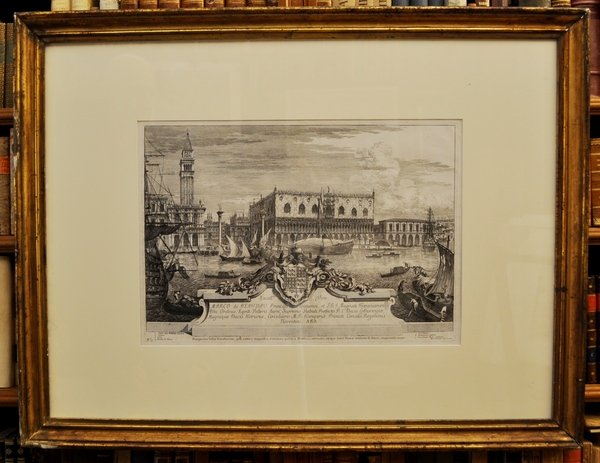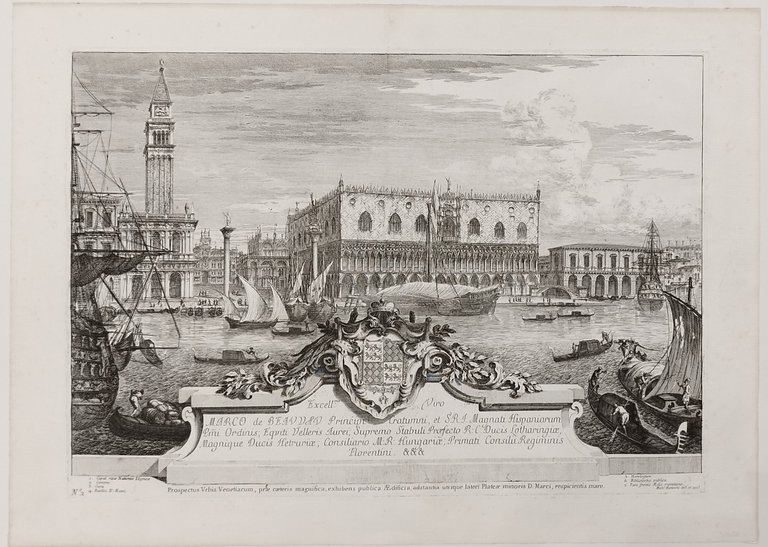Détails
Éditeur
Michele Marieschi 1741
Graveurs
Marieschi Michele
Description
Acquaforte e bulino di mm 328 x 470, su fglio di 395 x 548 mm.Vergata grossa. Filigrana con scudo e monogramma AV e 3 lune con la scritta IMPERIAL. Vergata grossa. II/IV stato. Dedica centrata dentro cartiglio blasonato con con riferimenti numerici e nome degli edifici. Titolo centrato sul margine inferiore (Prospectus Urbis Venetiarum, prae caeteris magnifica, exhibens publica Aedificia adstantia utrique lateri Plateae minoris D: Marci, rspicientis mare.), Mich. Marieschi del.t et inci.t, a sinistra N°2. Provenienza: "Magnificentiores selectioresque urbis Venetiarum prospectus, quos olim Michael Marieschi venetus pictor, et architectus in plerisque tabulis depinxit . Vendutur in vico Sancti Lucae apud eundem Auctorem Venetijs 1741 (ma 1742). Riporta Dario Succi nel volume "La Serenissima nello specchio di rame" a proposito di questo foglio: "La splendida acquaforte contiene la dedica a Marc-Antoine de Beauveau, il nobile lorenese che, nominato principe di Craon dall'Imperatore Carlo VI, nel 1737, alla morte di Giangastone dei Medici, fu mandato a Firenze per prendere possesso del Granducato di Toscana per conto di Francesco di Lorena, cui era stato assegnato nel 1735 al termine della Guerra di Successione Polacca. L'incisione fu probabilmente eseguita nel 1741, poco prima della richiesta del privilegio privativo. Lo stesso punto di vista venne utilizzato dall'artista in alcuni dipinti.". Michele Marieschi (1710-1743) figlio di un mediocre pittore, studiò con passione architettura e si staccò presto dal padre. Tornato in patria dalla Germania nel 1735, dipinse belle vedute di Venezia. Nel 1741 (o 1742) diede alle stampe la raccolta di 21 acquaforti tratte dalle sue tele. Le incisioni di Marieschi rendono meglio delle sue pitture quel mondo scenografico e teatrale che la Venezia quotidiana offriva all'occhio dell'osservatore. Succi 1987, 5 I/IV, Montecuccoli degli Erri, Pedrocco 1999, 5 I/IV, Mary Pittaluga 1952, p.35. (EN) Etching and burin of 328 x 470 mm, on a sheet of 395 x 548 mm. Filigree with shield and monogram AV and 3 moons with IMPERIAL writing. Coarse rod. II/IV state. Dedication centered inside a cartouche emblazoned with numerical references and the name of the buildings. Title centered on the lower margin, Mich. Marieschi del.t et inci.t, on the left N ° 2. Provenance: "Magnificentiores selectioresque urbis Venetiarum prospectus, quos olim Michael Marieschi venetus pictor, et architectus in plerisque tabulis depinxit . Vendutur in vico Sancti Lucae apud eundem Auctorem Venetijs 1741 (but 1742). Dario Succi reports in the volume "The Serenissima in the copper mirror" about this sheet: "The splendid etching contains the dedication to Marc-Antoine de Beauveau, the Lorraine noble who, appointed prince of Craon by the Emperor Charles VI, in 1737 , on the death of Giangastone dei Medici, he was sent to Florence to take possession of the Grand Duchy of Tuscany on behalf of Francesco di Lorena, to whom he had been assigned in 1735 at the end of the War of the Polish Succession. before the request for the privative privilege. The same point of view was used by the artist in some paintings .". Michele Marieschi (1710-1743), son of a mediocre painter, studied with passion for architecture and soon broke away from his father. Returning home from Germany in 1735, he painted beautiful views of Venice. 1741 (or 1742) he published the collection of 21 etchings taken from his canvases. Marieschi's engravings make the scenographic and theatrical world that daily Venice offered to the observer's eye better than his paintings. Succi 1987, 5 I/IV, Montecuccoli degli Erri, Pedrocco 1999, 5 I / IV, Mary Pittaluga 1952, p. 35.


Découvrez comment utiliser
Découvrez comment utiliser

